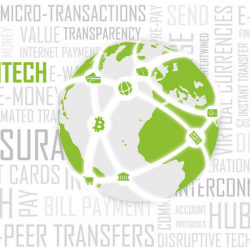Can FinTech Solve Climate Change and Income Inequality?

Climate change, FinTech and income inequality. At first glance, they seem like unrelated (although life-altering) concepts. In reality, though, they are deeply interlinked.
Climate change stands to be one of the most important issues of our time, a problem that needs to be solved (or at least properly addressed) before too much damage has been done and human life (as we know it) will be unable to continue.
Income inequality is a sad byproduct of human society and shows the damaging effects of hierarchy and greed. We have more than enough for the world’s population, yet stack the deck so only chosen sections get to fully benefit from the accumulated wealth.
These two terrors interlock and grow in proportion to each other. The more income inequality rises and power gets concentrated, the more our planet gets exploited (double the output at one-third the cost) and the closer we get to reaching midnight on the Doomsday clock.
Humanity is starting to recognize the injustice of these concepts and the faulty structure that led to these problems. The good news? There is a solution and that solution is FinTech. Big Data, for example, is being used to explore the best way to both save our planet and save our society. Water companies are leading the way in this respect. Last week we talked about the great work PlutoAI is doing to improve the water asset management systems. Aqueduct (a product from the World Resources Institute) is another great initiative seeking to improve the world through water management. This FinTech system helps governments and businesses access and analyze the water data to pinpoint where there are risks or dangers and where there is real opportunity. Billions of lives will be saved by this upgrade of water technology.
Looking to Africa, we can find real innovators in the field of FinTech environmentalism. One example is M-KOPA, a company that provides homes with solar power. M-KOPA uses FinTech as a form of payment and uses a pay-as-you-go model, allowing poorer clients access to the technology and thus increasing its reach.
And there is even a global effort underway: the Green Digital Finance Alliance. Recognizing the potential that FinTech holds to improve both our financial world and our environment, the Alliance seeks to explore how FinTech can be better used to create a better and cleaner Earth.
FinTech is aiming to do much more than just make the act of getting access to money easier. Through the reinvention of the financial system, FinTech is also helping to better our everyday lives and our planet. Yes, FinTech is going to improve our water and energy systems and, in turn, lead us to a brighter future.


